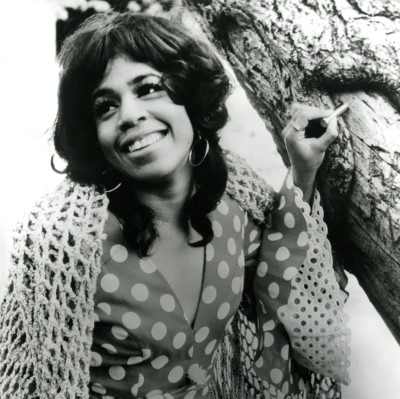A warm, quiet multi-faceted avatar of gospel-influenced, sophisticated romantic soul music, Valerie Simpson was, in the words of Berry Gordy, “a pintsized ball of dynamite, especially when working in the studio,” who first earned raves at Motown for her songwriting partnership with Nick Ashford that grew into acclaimed production duties, before cutting a pair of critically acclaimed solo LPs toward the end of her Motown tenure, albums that presaged Ashford and Simpson’s career as a beloved husband-and-wife singing duo for Warner Brothers and Capitol Records.
FAST FACTS:
- First Hit: as a composer (with Nick Ashford and Joshie Jo Armstead), “The Real Thing” for Tina Britt; as a recording artist, “Silly Wasn’t I.”
- Biggest Hit: as a composer (with Nick Ashford), “Ain’t No Mountain High Enough” (first for Marvin Gaye & Tammi Terrell, then for Diana Ross); as a recording artist, “Solid” (with Nick Ashford).
- Biggest Album: As a solo artist, Exposed; with Nick Ashford, Is It Still Good To Ya.
- Career Highlight: Take your pick — Induction into the Songwriters Hall of Fame, 12 Gold and Platinum Records, over 50 ASCAP Awards plus The Founders Award (ASCAP’s highest honor) and the Pioneer Award from the Rhythm & Blues Foundation.
Born in the Bronx, New York City in 1945, Valerie Simpson learns to play the piano by ear by the time she’s five. Soon, she’s playing at Harlem’s White Rock Baptist Church where her grandmother is the minister. In 1963, an aspiring but homeless songwriter who has moved to New York from Michigan, South Carolina-born Nick Ashford, visits the church and meets Val. They strike up a friendship and soon they are writing and singing together in a group, The Followers, with Shirley Reed, Mildred Hankenson and Andrew Cooper. After a few live performances, The Followers are signed to Roulette Records and later in ’63, release an LP of gospel songs entitled Meetin’.
Val and Nick leave The Followers to pursue careers in pop music in ’64. They sign with veteran music industry figure Henry Glover, then a Roulette executive who is restarting his own Glover Records. As Valerie & Nick, the duo write and record “I’ll Find You,” their first release, in ’64 which nearly makes the Top 100. They release two more strong singles that year on Glover which don’t chart and make some live appearances, but decide to focus on songwriting and producing with their new partner Joshie Jo Armstead, a former Ikette.
To supplement her income, Val also begins writing and singing jingles on national commercials for major products, for which she is well-compensated.
The three – who sometimes go by Jovalnick on record labels — begin freelancing in New York in 1965, having a few of their songs released on Atlantic, including “Let’s Go Get Stoned” by the Coasters, which goes nowhere. Their first success is on “The Real Thing,” written for Betty Everett on Vee-Jay but beaten on the charts by Tina Britt’s cover version for Eastern Records (released on London in the UK), which is rearranged to echo Martha & the Vandellas “Heat Wave.” It reaches Number 20 on the R&B chart.
Val, Nick and Joshie land steady work with a contract for Scepter Record’s publishing arm, Flomar Music, writing and producing for the company’s various labels and often singing background on the recordings with Val playing piano. Among their chart successes is future country superstar Ronnie Milsap’s “Never Had It So Good,” whose Jerry Butler-soundalike performance reaches Number 27 on the R&B listings (a second version of “Let’s Go Get Stoned” is the B-side), and Maxine Brown’s “One Step At A Time,” which hit Number 55 Pop. They also write their first duets for Brown and Chuck Jackson, including “I’m Satisfied,” which falls short of the Top 100.
Ray Charles hears Milsap’s version of “Let’s Go Get Stoned” in 1966 and decides to record it, resulting in a Number 1 R&B smash, his first in three and a half years, and peaking at 31 Pop. Later that year, Ray hears Nick’s recording on Verve of the Ashford-Simpson-Armstead rocker “I Don’t Need No Doctor” and covers it, again landing him on both the Pop and R&B charts.
The success of “Let’s Go Get Stoned” brings Val and Nick to Motown’s attention. Recruited by Eddie and Brian Holland, they sign songwriters’ contracts and send in a fresh batch of demos, including “Ain’t No Mountain High Enough.” Although other artists, including Dusty Springfield have asked Val and Nick to record “Mountain,” they have saved it for Motown where producers Johnny Bristol and Harvey Fuqua give it to the newly-formed duo of Marvin Gaye and Tammi Terrell. Released in April 1967, It skyrockets up the charts (Number 3 R&B, Number 19 Pop) and earns a Grammy nomination.
Bristol and Fuqua return to Val and Nick’s stash of new material for the follow-up and “Your Precious Love,” released in August 1967, explodes (Number 2 R&B, Number 5 Pop).
Looking for a third Marvin and Tammy hit, Val and Nick supply “Ain’t Nothing Like The Real Thing” but ask Berry Gordy for a producer’s contract. He conceives a competition between Ashford-Simpson and Bristol-Fuqua in Summer 1967 to see whose production of the song he favors. Val and Nick record their winning version in early autumn and they begin producing their compositions at Motown, still supplying backing vocals and Val’s piano. Her talents immediately win the respect of the Funk Brothers house band, legendarily known to be tough on new producers. Released five months later, “Ain’t Nothing Like The Real Thing” hits Number 1 on the R&B chart and Number 8 on the Pop chart.
At the same September session, Marvin and Tammi also record “Keep On Loving Me Honey,” but re-do the final lead vocals in October — and two days after, on October 12, Tammi collapses in Marvin’s arms during a performance at a Virginia college and is diagnosed with a brain tumor. Although Tammi is in a weakened condition, Val and Nick return to Hitsville to produce Marvin and Tammi on “You’re All I Need To Get By.” She and Nick sing the track’s signature background vocals. Released in July 1968, it becomes their second consecutive Number 1 R&B hit and rises to Number 7 on the Pop chart. It also reaches Number 19 in Great Britain, the duo’s biggest hit there.
“Keep On Lovin’ Me Honey” is pulled off Marvin and Tammi’s You’re All I Need To Get By LP in September 1968, nearly a year after it was recorded. It reaches Number 11 R&B and Number 23 Pop.
Tammi’s increasingly weakened state makes further recording difficult. It remains a source of controversy whether she actually records her parts for subsequent Marvin-Tammi releases produced by Val and Nick (including the singles “Good Lovin’ Ain’t Easy To Come By,” “What You Gave Me,” and “The Onion Song” and much of their third LP, Easy). In conversations years later for what would be his posthumous 1985 biography Divided Soul, Marvin tells author David Ritz that it’s Valerie’s voice imitating Tammi’s vocals on these records, a narrative that has been frequently repeated. However, Val, Nick and others steadfastly maintain that Tammi heroically did much of her own singing. While Simpson acknowledges she sings on the demos with Marvin, she says Tammi does come to the studio and, coached by Val, sings to the track line by line, taking frequent breaks to rest. Val admits some of her vocals were used to “doctor up” Tammi’s performances using production edits. “There were a couple things that were tweaked, but not a lot,” she’d tell The Chicago Tribune in 2011. “I couldn’t just sing like Tammi. People give me the credit of thinking I could be Tammi Terrell, but it’s just not true.”
Tammi passes away on March 16, 1970, at age 24.
In the late ‘60s, Val and Nick also write and produce “Destination: Anywhere” for the Marvelettes (which would become a hit again in the 1990s when it appears in the film The Commitments) plus writing and producing songs with a fresh take on the Motown Sound for numerous Hitsville acts like Marvin (as a solo artist), the Four Tops, the Temptations, Diana Ross & the Supremes, Smokey Robinson & the Miracles, Brenda Holloway, Martha & the Vandellas, Gladys Knight & the Pips, Bobby Taylor & the Vancouvers, Syreeta Wright and Blinky Williams.
Valerie sings alongside Melba Moore in the chorus on Blood, Sweat and Tears 1968 acclaimed debut LP, The Child Is Father To The Man.
Quincy Jones invites Valerie to supply vocals for the title track of his Grammy Award-winning 1969 LP Walking In Space.
In 1969, Valerie and Nick begin recording tracks for Diana Ross’s projected solo LP, with Val on piano. It will be their biggest Motown project, producing the landmark 1970 Diana Ross LP that launches her solo career. It also marks one of the first times that, apart from Smokey Robinson, a single Motown producer or production team is assigned all the tracks for an album. Released in June, it not only includes Ms. Ross’s debut single, “Reach Out And Touch (Somebody’s Hand)” — which goes Top 10 R&B and Top 20 Pop and continues to enjoy a long, strong afterlife — but also the dramatically re-imagined and rearranged “Ain’t No Mountain High Enough” which tops both Pop and R&B charts.
Back in front of the mic, Val receives critical plaudits for her gospel interpretation of “Bridge Over Troubled Waters,” the title song of Quincy Jones 1970 LP.
At a moment when singer/songwriters are getting long-deserved recognition (Carole King’s Tapestry is released three months prior), Val releases a solo LP produced by her and Nick on Tamla, Exposed, showcasing her as a forceful singer with stories to tell from a strong personal vision. Val, Nick and Joshie performed the backing vocals. Released in May 1971 (the same day as Marvin’s What’s Goin’ On LP), the LP reaches Number 30 on the R&B charts. “Sinner Man (Don’t Let Him Catch You)” becomes a radio and fan favorite, her cover of the Beatles “We Can Work It Out” outdoes most versions, and “There Is A God” receives a Grammy Nomination for Best Soul Gospel Performance.
Taken from Exposed, the single “Can’t It Wait Until Tomorrow” – a gutsier version than the vulnerable approach Diana Ross employed on her debut LP – becomes the LP’s lone single release. It does not chart.
Quincy Jones again enlists Val to sing on his 1971 Smackwater Jack album and she duets with Jones on Marvin’s “What’s Goin’ On.”
Ashford and Simpson produce Diana Ross’s 1971 LP Surrender, which features the hit “Remember Me.” Although the album is modestly successful in the U.S. (Number 63 Pop), it soars to Number 10 in the U.K. when Miss Ross’s Number 1 U.K. hit “I’m Still Waiting” (written by Deke Richards from her previous LP) is added to Surrender for the U.K. pressing and the album is re-titled I’m Still Waiting.
Motown asks Val and Nick for a second solo LP (a surprise to them, Val would later admit) and Valerie Simpson is released in July, 1972 on Tamla. It is as strong a collection as the first LP, concluding with two contrasting versions – one slow and folksy, one fast and funky — of the same song, “Genius,” a dire look at humanity. In its review, Rolling Stone praised her “first-class voice” and “the extra richnes of her songwriting gift.” Despite the album’s quality, it only reaches Number 50 on the R&B album chart.
A mashup of the two versions of “Genius” (with a different vocal) is scheduled for single release, then scraped and the proposed B-side, “Silly, Wasn’t I,” is issued as an A-side instead and becomes a hit, peaking on the charts at Number 24 R&B and Number 63 Pop. It is Val’s first hit as a vocalist.
With old friends from The Followers on backing vocals, Val and Nick make their first TV appearance in October 1972, singing from Val’s LPs to an appreciative audience on the PBS program Soul. The strong response pushes them to consider reviving their joint singing act.
Ashford and Simpson record a duet album for Motown, but the company declines to release it and it remains on the shelf. With their contract expiring, the perception that Motown wants them to focus on their songwriting and producing occasions their exit from Motown for a recording deal at Warner Brothers.
Starting in late 1973, Ashford and Simpson begin a run of chart entries at Warner Brothers – 22 in seven years, including “Send It,” “It Seems To Hang On,” and I Found The Cure.”
The duo continue as in-demand songwriters and producers. Among numerous projects, they co-write and arrange vocals for Quincy Jones 1978 Number 1 R&B hit “Stuff Like That,” for which they receive a Grammy Nomination for Vocal Arranging; Chaka Khan’s 1979 debut single “I’m Every Woman;” and two new songs (sung by Diana Ross) for the film version of The Wiz. ‘
They also continue their association with Motown, writing and producing the Dynamic Superiors’ self-titled debut LP in 1975, which includes the hit “Shoe Shoe Shine.” And they reunite in the studio with Diana Ross for her LP The Boss, all the tracks of which go to Number 1 on the Dance charts, while the title song reaches Number 12 R&B and Number 19 Pop.
In 1982, Ashford and Simpson move to Capital Records for whom they continue their string of chart success and record their biggest hit, “Solid,” which tops the R&B chart and climbs to Number 12 on the Pop side in 1984 and the Solid LP receives a Grammy Award nomination for Best R&B Performance by a Duo or Group. Their next LP, Real Love, is similarly nominated in 1985.
In 1990, Motown releases a 19-track compilation CD from their Composers Series of Ashford and Simpson’s better-known hit compositions on Berry Gordy’s labels, which includes Val’s recording of “Silly, Wasn’t I.”
In 1991, 16 tracks taken from Valerie’s LPs are compiled on CD for the first time on Best of Valerie Simpson.
In 1995, Method Man and Mary J. Blige record “I’ll Be There For You/You’re All I Need To Get By,” invoking the refrain from Nick and Val’s song.
Ashford and Simpson are inducted into the Songwriters Hall of Fame in 2002.
Universal UK compiles all the tracks on Valerie’s LPs for their 2004 CD release The Collection.
Sampling the opening instrumental hook from the Marvin and Tammi version of “Ain’t No Mountain High Enough,” Amy Winehouse has a Top 20 hit on both sides of the Atlantic in 2007 with “Tears Dry On Their Own.”
In 2010, former American Idol winner Fantasia samples the signature riff from “Your Precious Love” for her single “Collard Greens & Cornbread.”
Nick Ashford passes away in 2011 from cancer at age 70
In 2012, Valerie releases her third LP, Dinosaurs Are Coming Back Again, recorded over a decade earlier, shelved, then completed after Nick’s passing. Nina Simone and Roberta Flack contribute guest vocals and Val performs “Ain’t No Mountain High Enough” as an instrumental.
A new CD version of Valerie’s two Tamla LPs is issued on Caroline Records in 2015 with a bonus track, the single version of “Can’t It Wait Until Tomorrow.”





